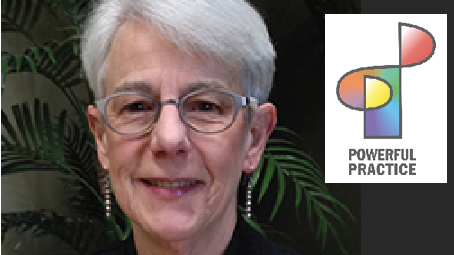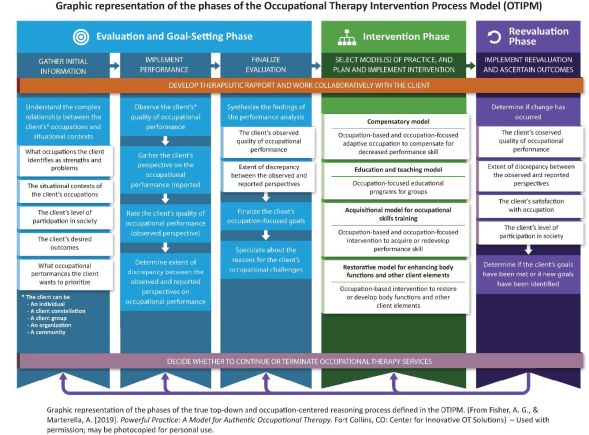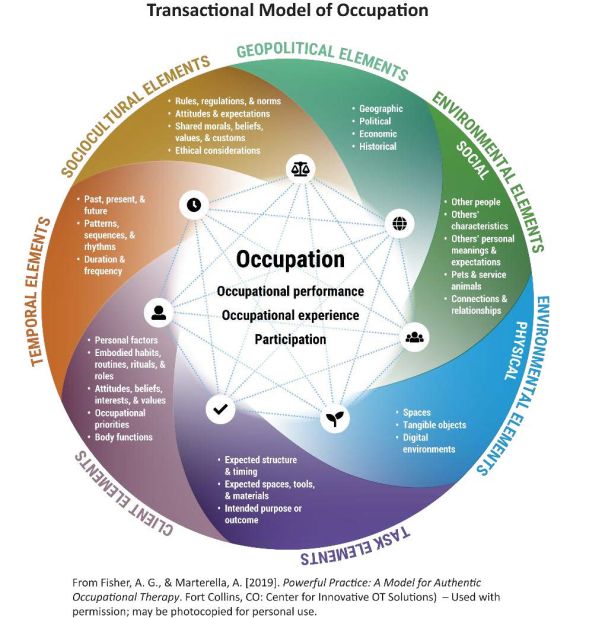
Powerful Practice: Planning and Implementing Authentic Occupational Therapy Services
Dr. Fisher is an internationally recognized expert in occupational therapy theory, functional assessment, and instrument development. Her research and works is internationally followed and quoted by renowned practicioners and scholars in the field of Occupational Therapy.
Join us to reignite your passion, strengthen your reasoning, and lead the way in advancing truly authentic occupational therapy.
This 3-day course is designed for occupational therapy clinicians, educators, students, and researchers who want to more fully harness the power of occupation and deliver authentic occupational therapy services.
It begins with a central idea:
- occupational therapists are continually challenged by the constraints of practice, education, and research
- occupational therapists long for ownership and pride in the work they do, and
- occupational therapists feel a deep need to practice authentically as occupational therapists while advancing the profession.
Based on Powerful Practice: A Model for Authentic Occupational Therapy (Fisher & Marterella, 2019), the course turns theory into practice.
Participants will learn how to:
- overcome, minimize, or work around the constraints they face in practice;
- reason about the complexity of occupation using the Transactional Model of Occupation;
- critique their evaluation and intervention methods and modify them to ensure they better align with authentic occupational therapy;
- use the Occupational Therapy Intervention Process Model (OTIPM) to guide the implementation of authentic occupational therapy services;
- implement and rate observation-based performance analyses of their clients’ quality of occupational performance; and
- build practice-based evidence that demonstrates the true power of occupation.
The course progresses step by step through the phases of the occupational therapy process. With lectures, video case examples, discussions, and extensive hands-on practice, participants will gain strategies to immediately enhance their practice, teaching, and research. The occupational therapists who take this course find that they leave inspired to embrace their unique expertise as occupational therapists and to make their practice more centered on occupation.
Background
This course had its origins in Professor Fisher’s 1998 Eleanor Clarke Slagle Lectureship and reflects more than 50 years of her contributions to occupational therapy. Central to her work is the Occupational Therapy Intervention Process Model (OTIPM), a framework that ensures therapists adopt an occupation-centered (OC) perspective to guide their reasoning when planning and implementing occupation-based (OB) and occupation-focused (OF) services (Fisher, 2013).
The OTIPM portrays the therapy process across three global phases—evaluation and goal setting, intervention, and reevaluation. Each step in this process may be OB, OF, or both (Fisher, 2013; Fisher & Marterella, 2019). Importantly, the OTIPM is not isolated: the Intervention Phase of OTIPM directly links the occupational therapy process to a variety of intervention models: compensatory, educational and teaching, acquisitional, and restorative approaches.
In 2018, when Fisher and Marterella began writing Powerful Practice, they recognized the need to revise the OTIPM and to develop a new conceptual model that captured the full complexity of occupation as an inextricably intertwined transactional whole. The result was the Transactional Model of Occupation, which is closely linked to the OTIPM. Today, the OTIPM serves as an overarching, integrated framework that encompasses (a) the OTIPM as a process model, (b) the four intervention models, and (c) the Transactional Model of Occupation as a conceptual model of occupation. Together, these elements make the OTIPM both comprehensive and practical, providing a clear roadmap for authentic occupational therapy.


Who Should Attend?
Occupational therapy clinicians, students, educators, and researchers who
Occupational therapy clinicians, students, educators, and researchers who
- Want a clear reasoning model that helps them organize the many evaluation and intervention options available and decide which to use at different phases of the OT process—making both practice and teaching more effective.
- Are ready to reinvigorate their work by confidently delivering services that are truly occupation-based and occupation-focused.
- Already feel good about their practice but want the chance to reflect, fine-tune, and strengthen what they do—becoming even more occupation-centered while also learning how to better communicate the power of occupation to others.
- Know it’s time for change but aren’t sure where to start—this course offers practical strategies to break through obstacles and move toward the kind of practice they envision.
Course description
This course focuses on bringing the OTIPM to life in everyday practice—together with the Transactional Model of Occupation and several intervention models. Through a mix of individual and group activities, participants will gain hands-on experience with:
- conducting standardized, occupation-focused and occupation-based evaluations of the quality of a person’s occupational performance, including social interaction; and
- creating clear, occupation-focused documentation.
Video case examples will reinforce key concepts, while structured discussions give participants the chance to share experiences and collaborate on practical strategies for overcoming obstacles to authentic occupational therapy services.
Course Objectives
At the conclusion of a 3-day OTIPM workshop, the participants will
At the conclusion of a 3-day OTIPM workshop, the participants will
- Understand the occupation-centered professional reasoning process defined in the OTIPM.
- Distinguish between occupation-centered reasoning and occupation-based and occupation-focused practice.
- Articulate various types of evaluations and interventions occupational therapists commonly use and evaluate which ones are ecologically-relevant, occupation-based, and/or occupation-focused.
- Apply true top-down and occupation-centered reasoning in the context of implementing occupation-based and occupation-focused services.
- Implement standardized observation-based performance analyses of a person’s quality of occupational performance.
- Understand when and how to link other occupational therapy models of practice and evaluation methods into the occupational therapy intervention process.
- Use the Transactional Model of Occupation to reason about the intertwined relationships among various elements of situational contexts and the elements of occupation: occupational performance, occupational experience, and participation.
- Write occupation-focused documentation, including observable and measurable client-centered goals.
- Use systematic strategies for accumulating practice-based evidence of the effectiveness of occupational therapy interventions.
Course Schedule
The schedule presented may vary, depending on group interest and needs.
May 11th (day one)
| 8.30 |
Registration and breakfast
|
| 9.00 |
Introduction to the course
Transactional Model of Occupation
|
| 10:15 | Break |
| 10.40 | Developing a common language A method for critiquing occupational therapy services |
| 11:30 | Stand-up pause |
| 11:40 | A method for critiquing occupational therapy services (cont.) |
| 12:30 | Lunch break |
| 13:30 | Legitimate occupational therapy interventions |
| 15:00 | Break |
| 15.25 | Legitimate occupational therapy interventions (cont.) |
| 16:00 - 17:00 |
Introduction to the OTIPM
Evaluation approaches
Case application — Gather initial information |
May 12th (day two)
| 8:00 | Breakfast |
| 8:30 | Case application — Document initial information |
| 9:00 | Case application — Implement performance analysis (motor and process skills) |
| 10:00 | Break |
| 10:25 | Case application — Implement performance analysis (cont.) |
| 12:00 | Lunch |
| 13:00 | Case application — Finalize evaluation: “cluster” and document baseline level of performance, client-centered goals, and speculated reasons for diminished occupational performance |
| 14:00 | Stand up pause |
| 14:10 | Case application — Finalize evaluation (continued) |
| 15:00 | Break |
| 15:25 - 16:30 | Case application — Intervention and document intervention plan, reevaluate and document outcomes |
May 13th (day three)
| 8:00 | Breakfast |
| 8:30 | Case application — Implement performance analysis (social interaction skills) |
| 10:00 | Break |
| 10:25 | Case application — Implement performance analysis (cont.) |
| 11:00 | Case application — Finalize evaluation: “cluster” and document baseline level of performance |
| 12:00 | Lunch |
| 13:00 | Case application — Finalize evaluation: client-centered goals, speculated reasons for diminished occupational performance, Intervention, and reevaluation |
| 13:45 | Using the Transactional Model of Occupation in practice. Framing function from a unique occupational therapy perspective. Implementing changes in practice — Overcoming obstacles and a call to action. |
| 14:30 | Break |
| 14:55 - 16.30 |
Implementing changes in practice — Overcoming obstacles and a call to action (continued).
Closing.
|